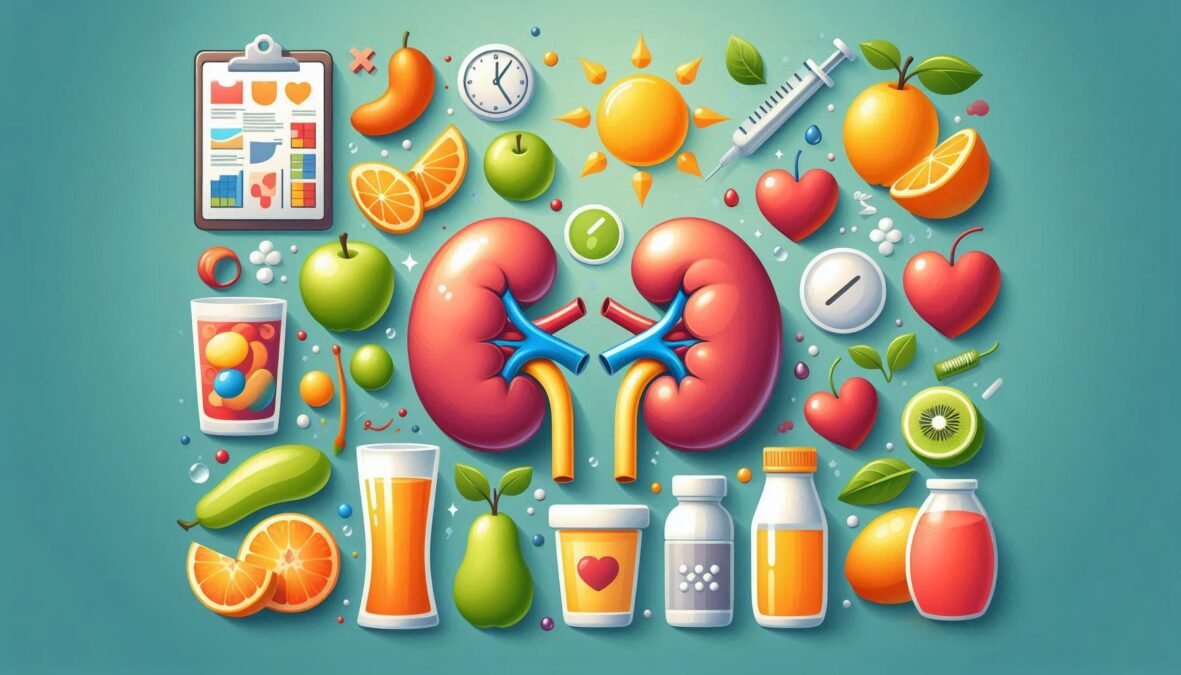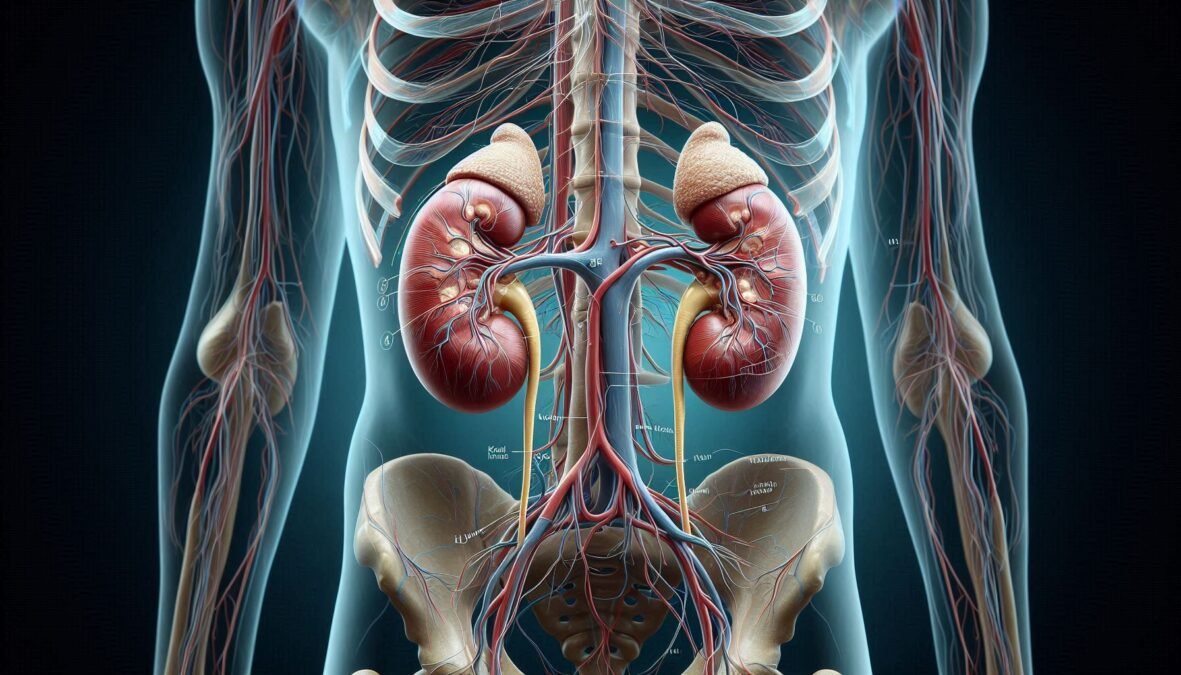Your kidneys are the unsung heroes of your body. These two bean-shaped organs are responsible for filtering waste, balancing fluids, controlling blood pressure, and even aiding in red blood cell production (erythropoiesis).
Yet, most of us don’t give them a second thought—until something goes wrong. Kidney disease is often dubbed a “silent killer” because it can sneak up with little or no symptoms until the damage is already severe.
The good news? A lot of kidney damage can be prevented—if we stop making everyday choices that slowly wear them down.
Just explore: Human Kidneys And Their Function
What do the kidneys actually do?
Before we dive into the harmful habits, let’s first appreciate just how vital your kidneys are. Think of them as your body’s sanitation workers. They filter 50 gallons of blood every single day, removing waste and extra fluids through urine. Besides that, they help:
- Regulate electrolyte levels (like sodium and potassium)
- Balance blood pH
- Control blood pressure by managing fluid levels and releasing hormones
- Stimulate red blood cell production through the hormone erythropoietin
- Activate Vitamin D to maintain bone health.
The tricky part about kidney disease is that it progresses quietly. Still, there are some subtle warning signs you can watch for:
- Fatigue or feeling weak
- Swelling in feet, ankles, or around the eyes
- Trouble concentrating
- Foamy or bloody urine
- Frequent urination, especially at night
- High blood pressure that’s hard to control.
List of Common Habits That Severely Damage The Kidneys
In this article, we’ll uncover common habits that severely damage the kidneys, many of which you might not even realize are harmful.
Habit #1. Too much salt intake
Salt is one of the biggest culprits behind kidney damage. While your body does need some sodium to function, too much salt forces your kidneys to work overtime. Excess sodium leads to water retention, which raises your blood pressure. High blood pressure, in turn, is one of the leading causes of kidney failure.
When your blood vessels are consistently under high pressure, they can become damaged over time. This affects the delicate filtering system of the kidneys, making them less efficient and more prone to failure.
Here’s the kicker: most people consume way more than the recommended 2,300 mg of sodium per day—often without realizing it.
Habit #2. Dehydration
Your kidneys need water to do their job. Dehydration makes it harder for them to filter waste, and over time, this can lead to the formation of kidney stones (renal calculi) and urinary tract infections—both of which can damage kidney tissue if untreated.
When you’re dehydrated:
- Urine becomes more concentrated (darker and smellier)
- Toxins linger longer in the body
- Blood pressure can drop, reducing kidney filtration rate
- Risk of stone formation increases due to mineral buildup
Chronic dehydration may contribute to acute kidney injury (AKI) or long-term decline in kidney function
Habit #3. Sleeping too little or too much
Sleep is your body’s natural repair mode—and that includes your kidneys. Poor sleep disrupts your circadian rhythm, which plays a role in kidney function. Studies have found that short sleep duration (under 6 hours) and long sleep duration (over 9 hours) are both linked with a decline in kidney performance.
Sleep deprivation can increase stress hormone levels, lead to poor blood sugar regulation, and cause blood pressure spikes—all of which are dangerous for kidney health. Meanwhile, oversleeping may be a sign of underlying metabolic dysfunction that puts additional strain on the kidneys.
Have a look into: Sleep Anxiety: How to Manage Anxiety-Induced Insomnia (Sleeplessness)
Habit #4. Eating too much protein
Protein is essential for muscle repair, immune function, and energy—but too much of a good thing can be harmful, especially to your kidneys. High-protein diets, like keto or paleo, are popular for weight loss and bodybuilding. But when you overdo it, your kidneys have to work harder to eliminate nitrogen, a byproduct of protein metabolism.
Over time, this constant pressure can accelerate kidney function decline, particularly in people with pre-existing kidney issues. Studies show that individuals with early-stage kidney disease who consume excessive protein have a significantly higher risk of progressing to kidney failure.
Habit #5. Holding in urine frequently
We’ve all done it—maybe you’re stuck in traffic or caught in a meeting and decide to wait to use the bathroom. But frequently ignoring the urge to urinate can cause a buildup of bacteria in the bladder, increasing the risk of urinary tract infections (UTIs). These infections can travel up to the kidneys and lead to kidney infections (pyelonephritis), which can result in permanent damage if left untreated.
Holding in urine also increases bladder pressure, which can lead to weakened bladder muscles and poor urinary control over time. Your kidneys get the signal that your bladder is full, but when you don’t relieve it, it creates backpressure that stresses the entire urinary tract system.
Habit #6. Excessive sugar intake
It’s no surprise that sugar isn’t great for your health, but did you know it can indirectly wreak havoc on your kidneys? Excessive sugar leads to insulin resistance, obesity, and type 2 diabetes—all of which are major risk factors for chronic kidney disease.
Sugary drinks, desserts, and processed snacks spike blood sugar levels, which over time cause blood vessel damage in the kidneys. Once the filtering units are damaged, your kidneys become less effective at doing their job—and this can eventually lead to end-stage kidney failure.
Habit #7. Sedentary or inactive lifestyle
A sedentary lifestyle is linked with a host of chronic health issues, and your kidneys are no exception. Sitting for prolonged periods or skipping regular physical activity can contribute to obesity, high blood pressure, and type 2 diabetes—the three biggest risk factors for kidney disease.
Inactivity can also lead to poor circulation, which impacts how efficiently your kidneys receive and filter blood. Over time, the lack of movement may cause gradual organ deterioration. Studies have shown that people who sit for more than 8 hours a day without physical activity are at significantly greater risk of developing CKD (Chronic Kidney Disease).
Habit #8. High caffeine consumption
Caffeine is a double-edged sword. It keeps us alert and boosts energy, but too much can strain the kidneys. High doses of caffeine increase blood pressure and act as a diuretic, which can lead to dehydration—a combination that’s not ideal for kidney function.
Chronic overconsumption of caffeine may reduce blood flow to the kidneys and, in extreme cases, contribute to kidney stone formation. While a cup or two of coffee is usually fine, things get risky when you start downing energy drinks, sodas, and multiple cups of coffee daily.
Habit #9. Smoking and alcoholism
We all know smoking ruins your lungs, but few realize it also takes a toll on your kidneys. Smoking narrows the blood vessels, reducing blood flow to the kidneys and decreasing their ability to function. Over time, this can lead to kidney scarring and impaired filtration.
Smokers are also at a much higher risk of developing high blood pressure and type 2 diabetes, both of which are leading causes of chronic kidney disease. In fact, studies show that smoking doubles the risk of kidney failure.
Habit #10. Ignoring diabetes and hypertension
If you’re living with high blood pressure or diabetes, and you’re not managing them properly, your kidneys are already in the danger zone. Both conditions are known as “silent killers” because they cause internal damage without showing early symptoms.
Over time, uncontrolled blood sugar can damage the tiny blood vessels in the kidneys (a condition known as diabetic nephropathy). Similarly, high blood pressure can weaken arteries around the kidneys, limiting their ability to filter blood efficiently.
The tragic part? Many people don’t take these conditions seriously until they’ve already caused irreversible damage.
Also read: How To Lower Blood Pressure Without Medication
How to Modify Habits That Severely Damage the Kidneys
We’ll walk you through the most effective ways to avoid habits that severely damage the kidneys, offering you practical, easy-to-follow advice for a healthier future.

1. Limit Sodium Intake
Cook at home using fresh ingredients to control sodium levels
Use herbs and spices like garlic, paprika, lemon juice, and basil for flavor
Choose “low-sodium” or “no salt added” versions of canned and packaged foods
Skip the table salt—taste your food first
Avoid processed meats, frozen dinners, instant noodles, and salty snacks
Read: 7 Superfoods For Kidney Health You Must And Should Eat
2. Stay hydrated
Aim for at least 2 to 2.5 liters of water daily (more if you’re active)
Drink water steadily throughout the day—not just when you’re thirsty
Add flavor with lemon, mint, or cucumber if plain water is boring
Eat water-rich fruits and veggies like watermelon, cucumbers, and oranges
Carry a reusable bottle with you everywhere and sip regularly
3. Get quality sleep
Aim for 7–8 hours of uninterrupted sleep per night
Stick to a consistent bedtime—even on weekends
Keep your room dark, quiet, and cool for better sleep quality
Avoid screens, caffeine, and alcohol at least an hour before bed
Create a relaxing bedtime routine—reading, stretching, or a warm bath.
4. Focus on Whole Foods Over Protein-Heavy Meals
Add beans or lentils to salads instead of chicken every time
Make stir-fries with tofu and lots of vegetables
Use quinoa or chickpeas as a base instead of always opting for grilled meat
Try “meatless Mondays” to balance your weekly intake
5. Make regular bathroom routine
Drink small amounts of water consistently throughout the day instead of chugging all at once
Set reminders or alarms to check in with your body and use the bathroom
Use restroom breaks as mental breaks during work or screen time
If you’re shy about public restrooms, identify clean and accessible spots wherever you go
Avoid “just in case” peeing too frequently as that can also lead to bladder signaling issues
6. Eat a balanced and low-sugar diet
Making one swap at a time (e.g., water instead of soda)
Choosing “sweet” whole foods like fruit when cravings hit
Cooking more at home to control ingredients
Shopping the perimeter of the grocery store (where whole foods live)
Replacing sugar-laden comfort foods with non-food rewards like a walk, book, or hobby.
7. Stay physically active
Take a brisk 30-minute walk at least five days a week
Use stairs instead of elevators
Set an alarm to stand up and stretch every 60 minutes
Join a low-impact exercise class like yoga or swimming
Do light strength training at home (resistance bands or bodyweight)
8. Lower caffeine intake
- Water: Staying adequately hydrated is fundamental for kidney health and overall energy levels.
- Decaf coffee: Provides the taste and ritual of coffee with minimal caffeine.
- Herbal teas: Many varieties are caffeine-free and offer various health benefits (e.g., peppermint, chamomile, ginger, rooibos).
- Matcha tea: Contains less caffeine than coffee and provides a calmer, sustained energy due to L-theanine.
- Chicory coffee: A caffeine-free alternative with a similar taste to coffee, and a source of beneficial inulin (prebiotic fiber).
- Golden milk (turmeric latte): A comforting, caffeine-free drink with anti-inflammatory properties.
- Yerba mate: Contains caffeine but often provides a less “jittery” energy than coffee.
- Green tea: Contains less caffeine than coffee and also has L-theanine.
- Smoothies: Packed with nutrients, fruits, and vegetables for natural energy.
9. Quit or cut smoking and alcohol
Set a quit date and make a plan—whether cold turkey or gradual reduction
Get support from a therapist, support group, or a smoking cessation program
Replace the habit with a healthy alternative (e.g., walk, snack, water)
Track your progress and reward yourself for milestones
For alcohol, stick to 1 drink/day for women and 2 for men, maximum
Stay hydrated when drinking and avoid binge episodes
10. Manage diabetes and hypertension properly
Monitor your blood glucose levels if you’re diabetic
Take medications exactly as prescribed
Follow a kidney-friendly diet (low in sodium and sugar)
Don’t skip doctor visits—review your kidney function at least annually
Report any unusual symptoms like swelling, fatigue, or changes in urination
Explore: Surprising things that can hurt your kidneys
conclusion
Your kidneys are the quiet workhorses of your body, filtering your blood and keeping everything in balance. But they can only take so much abuse. By becoming aware of the daily habits that damage them—many of which seem harmless—you can take control of your health and avoid the slow creep of chronic kidney disease.
The good news? Your kidneys have an incredible ability to recover if you catch issues early and make better lifestyle choices. Start by drinking more water, eating clean, exercising regularly, and cutting out unnecessary medications and chemicals.





